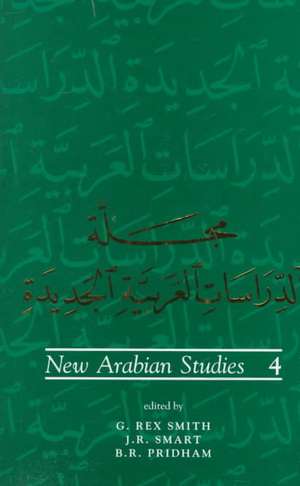New Arabian Studies Volume 4: New Arabian Studies, cartea 4
Editat de B. R. Pridham, J.R. Smart, G. Rex Smithen Hardback – 31 dec 1996
New Arabian Studies is an international journal covering a wide spectrum of topics including geography, archaeology, history, architecture, agriculture, language, dialect, sociology, documents, literature and religion. It provides authoritative information intended to appeal to both the specialist and general reader. Both the traditional and the modern aspects of Arabia are covered, excluding contemporary controversial politics.
Contributions by
Hasan M. al-Naboodah, S. al-Theeb, Mohammed A. R. Al-Thenayian, Anne Katrine Bang, Peter G. Emery, Anda Hofstede, Alexander Knysh, Eric Macro, Mikhail Rodionov and Hamad Bin Seray
Contributions by
Hasan M. al-Naboodah, S. al-Theeb, Mohammed A. R. Al-Thenayian, Anne Katrine Bang, Peter G. Emery, Anda Hofstede, Alexander Knysh, Eric Macro, Mikhail Rodionov and Hamad Bin Seray
Preț: 427.00 lei
Preț vechi: 537.10 lei
-20% Nou
Puncte Express: 641
Preț estimativ în valută:
81.71€ • 85.52$ • 68.01£
81.71€ • 85.52$ • 68.01£
Carte indisponibilă temporar
Doresc să fiu notificat când acest titlu va fi disponibil:
Se trimite...
Preluare comenzi: 021 569.72.76
Specificații
ISBN-13: 9780859895521
ISBN-10: 0859895521
Pagini: 300
Ilustrații: illustrations
Dimensiuni: 229 x 147 x 25 mm
Greutate: 0.58 kg
Ediția:1
Editura: UNIVERSITY OF EXETER PRESS
Colecția University of Exeter Press
Seria New Arabian Studies
Locul publicării:United Kingdom
ISBN-10: 0859895521
Pagini: 300
Ilustrații: illustrations
Dimensiuni: 229 x 147 x 25 mm
Greutate: 0.58 kg
Ediția:1
Editura: UNIVERSITY OF EXETER PRESS
Colecția University of Exeter Press
Seria New Arabian Studies
Locul publicării:United Kingdom
Notă biografică
G. Rex Smith is retired and was previously Professor of Arabic, University of Manchester B.R. Pridham is the former Director of the Centre for Arab Gulf Studies, University of Exeter. J.R. Smart is retired and was previously a lecturer in Arabic, University of Exeter
Cuprins
Foreword and Acknowledgements
Guidelines and Transliteration Scheme for Contributors
Review Notices
‘This is an Announcement to the People…’—The Bayan of 1912 by Muhammad B. ‘Ali Al-Idrisi in ‘Asir
Anne Katrine Bang
Omani Proverbs: Problems in Translation
Peter G. Emery
Description of the Johnstone Papers held in the Palace Green Section of the University Library of Durham
Anda Hofstede
The Cult of saints and Islamic Reformism in Early Twentieth Century Hadramawt
Alexander Knysh
The Red Sea and Wyman Bury—The Last Seven Years, 1913-1920
Eric Marco
Banu Nabhan in the Omani Sources
Hasan M. al-Naboodah
The Labour Code of the Sultan ‘Ali b. al-Mansur al-Kathiri, 1351/1932
Mikhail Rodionov
The Arabian Gulf in Syriac Sources
Hamad Bin Seray
The Native Land of the Banataeans
S. al-Theeb
A Preliminary Evaluation of Al-Rada’i’s Urguzat al-Hagg as a Primary Geographical Source for Surveying the Yemeni Highland Pilgrim Route
Mohammed A.R. Al-Thenayian
Notes on Contributors
Guidelines and Transliteration Scheme for Contributors
Review Notices
‘This is an Announcement to the People…’—The Bayan of 1912 by Muhammad B. ‘Ali Al-Idrisi in ‘Asir
Anne Katrine Bang
Omani Proverbs: Problems in Translation
Peter G. Emery
Description of the Johnstone Papers held in the Palace Green Section of the University Library of Durham
Anda Hofstede
The Cult of saints and Islamic Reformism in Early Twentieth Century Hadramawt
Alexander Knysh
The Red Sea and Wyman Bury—The Last Seven Years, 1913-1920
Eric Marco
Banu Nabhan in the Omani Sources
Hasan M. al-Naboodah
The Labour Code of the Sultan ‘Ali b. al-Mansur al-Kathiri, 1351/1932
Mikhail Rodionov
The Arabian Gulf in Syriac Sources
Hamad Bin Seray
The Native Land of the Banataeans
S. al-Theeb
A Preliminary Evaluation of Al-Rada’i’s Urguzat al-Hagg as a Primary Geographical Source for Surveying the Yemeni Highland Pilgrim Route
Mohammed A.R. Al-Thenayian
Notes on Contributors
Recenzii
“It is strongly recommended that anyone interested in Arabia subscribe to this annual volume.” –Yemen Update
“It is good that New Arabian Studies provides also a forum for the work of contemporary Arab scholars who have done research work in British universities before returning to posts within the Peninsula.” –Royal Asiatic Society, Vol 10, Part 1, April 2000
“This volume, like its predecessors in this series, includes a variety of topics all relating to the Arabian Peninsula. We find articles on language and literature, dialect, geography, archaeology, history, architecture, agriculture, sociology, religion and documents. It also includes illustrations and reproduction of documents in facsimile form, where needed, to support the text. The journal's main aim is to make available to scholars with specializations in various aspects of Arabia new research findings, in addition to traditional themes treated separately or in joint anthologies and also to entice those living in or interested in Arabia to join researchers in making contributions of their own. . . It would be difficulty for this reviewer to generalize on the quality of articles in this volume of Arabian Studies. One can safely say that the authors are specialists in the fields they wrote about, either through training and basic research or through personal experience. Diversity in the topics enlisted reflects also the range of the journal's interests in research and publication on the Arabian peninsula. Generally, the authors have bequeathed the reader a wealth of first-hand data, regardless of the field of specialization, which scholars should find useful in carrying out their work. The editors, as usual, have done an excellent job in controlling the quality of transcription, even though more than one system was employed.” –Journal of Semitic Studies, Volume 44, Number 2 1999
“The standard is high and the spread impressive . . . Anyone concerned with Arabia will find things of interest here . . . Though the journal avoids current politics, the contributions are also valuable in following new events.” –Asian Affairs
“The contributions are consistent in their scholarly level and the editors deserve congratulation on their judicious choice of material for inclusion. A high standard has been set and one can but wish New Arabian Studies every success for the future.” –Bulletin of the School of Oriental and African Studies




